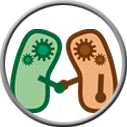Team:Calgary/Notebook/Protocols/Process3
From 2011.igem.org
(Difference between revisions)
Emily Hicks (Talk | contribs) |
Emily Hicks (Talk | contribs) |
||
| Line 33: | Line 33: | ||
</CENTER> | </CENTER> | ||
| - | <li | + | <li>Mix components by gently vortexing and then centrifuge 4s to collect contents.</li> |
| - | <li | + | <li>Incubate in a PCR machine using the following conditions:</li> |
<tr> | <tr> | ||
| Line 53: | Line 53: | ||
</tr> | </tr> | ||
</table> | </table> | ||
| - | <li | + | <li>After completion of cDNA synthesis, us 1/20th of the first-strand reaction (2-4μL) for PCR amplification in water. Also do 2,3, and 4-fold dilutions of each sample to ensure that the PCRs will be within the primer linear range. Do 3 replicates of each PCR reaction. Run PCRs on a real-time PCR machine (e.g. ABI 7900).</li> |
<br></br><br></br><br></br> | <br></br><br></br><br></br> | ||
</ol> | </ol> | ||
</html>}} | </html>}} | ||
Revision as of 22:02, 27 September 2011









cDNA Synthesis/Reverse Transcription Reaction

- Thaw all components (except the enzyme/buffer mix), mix thoroughly and centrifuge before use.
- Add the following to a 0.2mL thin-walled PCR tube sitting on ice:
- Mix components by gently vortexing and then centrifuge 4s to collect contents.
- Incubate in a PCR machine using the following conditions:
- After completion of cDNA synthesis, us 1/20th of the first-strand reaction (2-4μL) for PCR amplification in water. Also do 2,3, and 4-fold dilutions of each sample to ensure that the PCRs will be within the primer linear range. Do 3 replicates of each PCR reaction. Run PCRs on a real-time PCR machine (e.g. ABI 7900).
| Component | Volume |
| RNA (40ng – 10ng to 1μg total RNA) | variable |
| Nuclease free water | variable |
| qScript cDNA synthesis mix | 4 uL |
| Final Volume | 20 uL |

 "
"






